June 7, 2005

Big Brother in the Garden—You know things are getting tight when you wind up agreeing with Justice Clarence Thomas, who apparently got the decision on medical marijuana right and did so for the right reasons. The justices ruled yesterday that the federal government has the right to prosecute the possession of marijuana even for medical uses and even in the 11 states that had passed laws legalizing it. Oddly, it was the liberal justices that won out. At first blush, it seemed a slam dunk that the U.S. Supreme Court would rule that way: every first year law student knows that federal law trumps state law every time. But this was different, or, as Justice Thomas wrote in a dissent: “Diane Monson and Angel Raich [the defendants] use marijuana that has never been bought or sold, that has never crossed state lines, and that has no demonstrable effect on the national market for marijuana. If Congress can regulate this under the commerce clause, then it can regulate virtually anything - and the federal government is no longer one of limited and enumerated powers.” Exactly. William Renquist, by the way, also voted in the minority. He is a cancer patient. Sandra Day O'Connor, however voted with the majority. So is she. It’s none of the federal government’s damned business. Read the decision here.

Come and get us, big guys—Meanwhile, in those states were the people and/or their representatives voted to legalize medical marijuana, there was defiance, and also the well-founded hope that the federal government has more important things to do than raid their basements looking for a couple of weeds. The feds usually go after the big guys and leave the little ones to local officials, who in California, at least, rarely give a damn. The grand theocracy in the White House, however, may see differently. At least one group, WAMM, based in Santa Cruz (where marijuana comes in second only to artichokes as a cash crop) said it would probably have to fold its seaside communal garden. Some supporters expressed hope that Congress would take up the court’s idea that it had the right to change the law. Good luck.

Got poison?—The federal government asked the National Academy of Science to remove an article from its website that described how terrorists could poison the nation’s milk supply. NAS complied. The paper, written by Stanford’s Lawrence M. Wein and grad student Yifan Liu, appeared briefly in a section of the academy’s website set aside for journalists to give the writers an advanced look at papers to be published in the academy's Proceedings. The paper described how the milk supply could be contaminated and what to do to protect it. The feds, in the person of Health and Human Services assistant secretary Stewart Simonson, called it a “road map” for terrorists. “It seems clear on its face that publication of this manuscript could have very serious public health and national security matters.” Of course, some of us might make the case that it is also a warning of an avenue of attack and road map on how to protect the milk supply, but the federal government must know best.

They forgot Catch 22—Human Events, the national wingnut weekly, had a fascinating piece a few days ago, listing the Ten Most Harmful Books of the 19th and 20th Centuries, which is (seriously) an interesting idea. The books they came up with were in some cases predictable, in some cases hilarious and in a few cases so obscure or unread as to be irrelevant. The most dangerous, of course, was The Communist Manifesto (Marx & Engels), followed by Mein Kampf (by the name that is not spoken), and then Quotations from Chairman Mao. So far, I’m with them, although I would have changed the order. Then things start getting weird, with the Kinsey Report going at number four (“designed to give a scientific gloss to the normalization of promiscuity and deviancy”—don’t you just love it when they fall apart?). Then comes Democracy and Education by that well-known subversive John Dewey; Das Kapital (Marx makes it twice); The Feminine Mystique (small sexual organs made you do that); The Course of Positive Philosophy by Auguste Comte (wouldn’t know); Beyond Good and Evil by Freidrich Nietzsche [“God is Dead”—Nietzsche/ “Nietzsche is dead”—God), and finally, General Theory of Employment, Interest and Money by John Maynard Keynes (“a recipe for ever expanding government”). Paul Ehrlich, Johns Stuart Mill, B.F. Skinner, Margaret Mead, Ralph Nader and Rachel Carson, among others, got honorable mention. Darwin made it twice, Freud once. I'm not making this up. Nothing by Ann Coulter or Ayn Rand. All are, of course, available at your local bookstore.
No comments:
Post a Comment